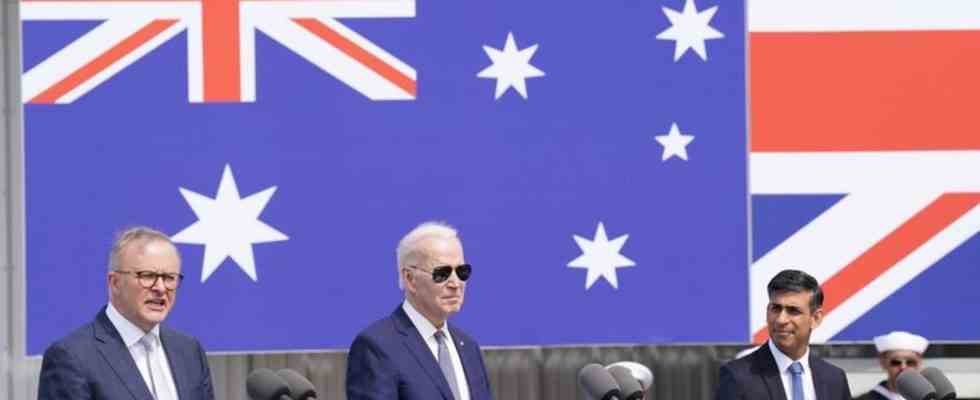defense
Indo-Pacific: US and partners advance submarine deal
US President Joe Biden, British Prime Minister Rishi Sunak and Australian counterpart Anthony Albanese hold a press conference in San Diego, California. It’s about security and military deterrence in the Indo-Pacific. photo
© Stefan Rousseau/PA Pool via AP/dpa
Eighteen months ago, the US, UK and Australia announced the goal of building a nuclear-powered submarine fleet. Now they present a concrete timetable for this. How is China reacting?
The USA, Great Britain and Australia are filling their pact to build a nuclear-powered submarine fleet for the Indo-Pacific with life – and in doing so are also sending a signal regarding China’s striving for power in the region.
US President Joe Biden and UK and Australian leaders Rishi Sunak and Anthony Albanese at a meeting in San Diego yesterday (local time) announced a concrete timeline to equip Australia with nuclear-powered submarines to strengthen military deterrence in the Indo-Pacific to strengthen space. They had already issued the general goal 18 months ago – now they presented the details for the billion-dollar project.
The Schedule
In the coming years, joint exercises are initially planned, as well as the training of Australian seamen, engineers and technicians on nuclear-powered submarines. American and British submarines are to call more at ports in Australia and Australian seamen are to be integrated into US and British submarine units. From 2027, US and UK rotating submarine units are to be stationed in Australia.
Once the Australians were properly trained, they would build their own nuclear-powered submarine fleet, it said. Australia will initially purchase three conventionally armed nuclear-powered submarines from the United States, with the option to purchase two more if needed. In the long term, the three countries ultimately want to develop and manufacture a new submarine model that combines American, British and Australian technology. This is said to be built first in the UK from the late 2030s and also in Australia itself from the 2040s.
No nuclear weapons
Biden described the security alliance as a “powerful entity”. At the meeting in a military port in San Diego on the west coast of the USA, the US President emphasized that the submarine pact had nothing to do with nuclear weapons. “These submarines are nuclear powered, not nuclear armed,” he said. “These boats will not have any nuclear weapons on board.” The nuclear drive is tested and safe. The US and UK had used it for almost 70 years, and both countries’ submarines would have circumnavigated the entire globe without incident. The technology is now shared with Australia.
Sunak spoke of a “powerful partnership” and emphasized: “For the first time ever, three submarine fleets in both the Atlantic and the Pacific will work together to keep our oceans free, open and thriving for the next few decades.” Albanese said the project strengthens his country’s national security and stability across the region.
A message to China?
The USA, Great Britain and Australia launched their security alliance called Aukus in September 2021. The name is derived from the English abbreviations of the three countries (AUS, UK and USA). Security experts see the alliance and its project primarily as an attempt to counter China’s increasing thirst for power in the Indo-Pacific – even if the three countries assure that their alliance is by no means directed against a specific country.
Biden’s national security adviser, Jake Sullivan, stressed that the alliance does not send a message to a single country. Rather, it is a positive message to all countries in the region and the world. The announcement of the plans did not come out of nowhere, but had been prepared for over 18 months. “We have indeed consulted closely with allies, partners and countries across the Indo-Pacific region,” he said, “and we have spoken directly to China to explain to them what Aukus is and is not.”
Potential for further upsets
In 2021, Beijing reacted with outrage to the founding of the Aukus Alliance. Since then, tensions between China and the US have escalated over a range of issues. China’s head of state Xi Jinping recently publicly struck unusually sharp tones and accused the United States and the West of wanting to prevent China’s rise in the world. He spoke of “containment, encirclement and suppression of China”.
When asked by reporters if he feared that Xi might take the new Aukus push as aggression given these statements, Biden simply said: “No.” When asked if he plans to speak to Xi in person, Biden replied, “Yes.” The US President and his team did not comment on exactly when this could happen. Most recently, communication between the two governments was reduced to a minimum.
Elsewhere in the world, the three Aukus countries had also caused resentment with their pact: France was downright angry when the new alliance was presented in 2021, because the Aukus pact included a 56 billion euro contract for the delivery of French submarines to Australia burst.

